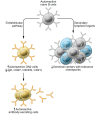The intersection of COVID-19 and autoimmunity
- PMID: 34710063
- PMCID: PMC8670833
- DOI: 10.1172/JCI154886
The intersection of COVID-19 and autoimmunity
Abstract
Acute COVID-19, caused by SARS-CoV-2, is characterized by diverse clinical presentations, ranging from asymptomatic infection to fatal respiratory failure, and often associated with varied longer-term sequelae. Over the past 18 months, it has become apparent that inappropriate immune responses contribute to the pathogenesis of severe COVID-19. Researchers working at the intersection of COVID-19 and autoimmunity recently gathered at an American Autoimmune Related Diseases Association Noel R. Rose Colloquium to address the current state of knowledge regarding two important questions: Does established autoimmunity predispose to severe COVID-19? And, at the same time, can SARS-CoV-2 infection trigger de novo autoimmunity? Indeed, work to date has demonstrated that 10% to 15% of patients with critical COVID-19 pneumonia exhibit autoantibodies against type I interferons, suggesting that preexisting autoimmunity underlies severe disease in some patients. Other studies have identified functional autoantibodies following infection with SARS-CoV-2, such as those that promote thrombosis or antagonize cytokine signaling. These autoantibodies may arise from a predominantly extrafollicular B cell response that is more prone to generating autoantibody-secreting B cells. This Review highlights the current understanding, evolving concepts, and unanswered questions provided by this unique opportunity to determine mechanisms by which a viral infection can be exacerbated by, and even trigger, autoimmunity. The potential role of autoimmunity in post-acute sequelae of COVID-19 is also discussed.
Conflict of interest statement
Figures



References
Publication types
MeSH terms
Substances
Grants and funding
LinkOut - more resources
Full Text Sources
Medical
Miscellaneous

